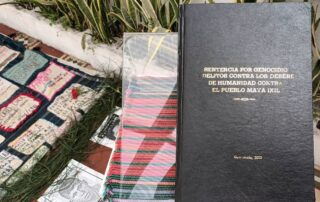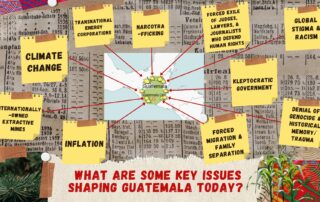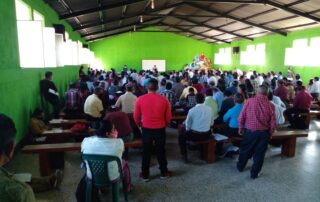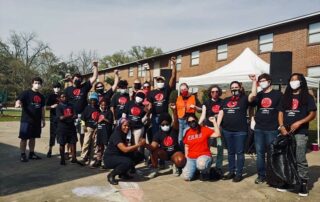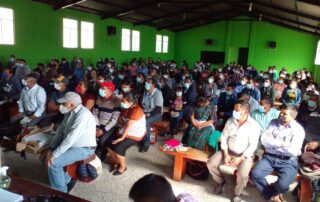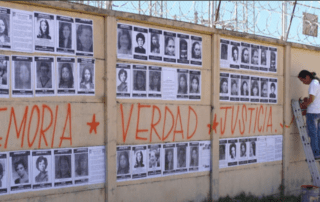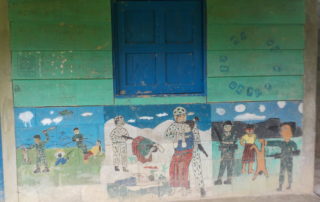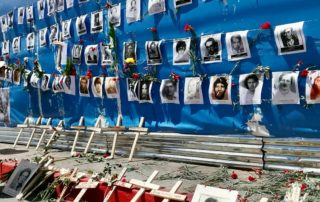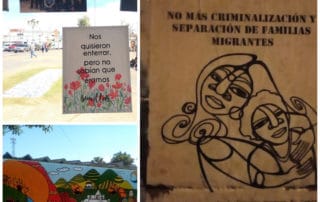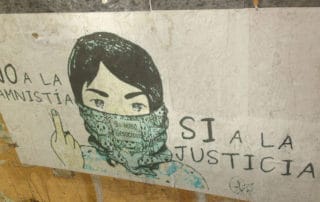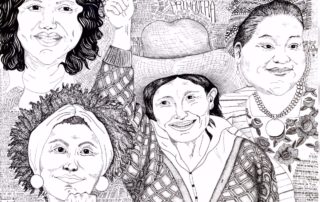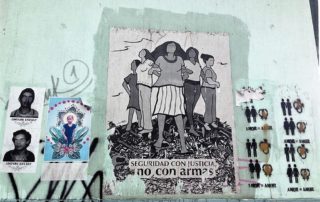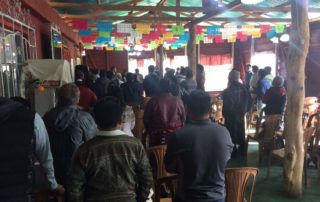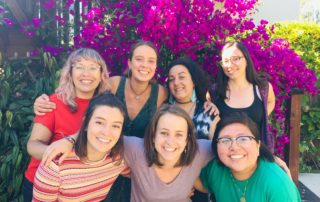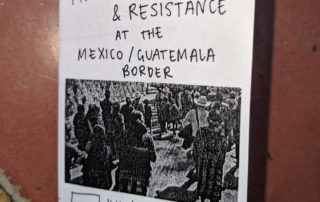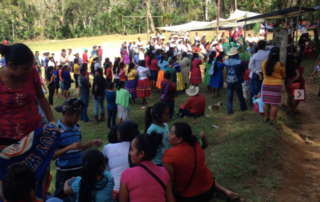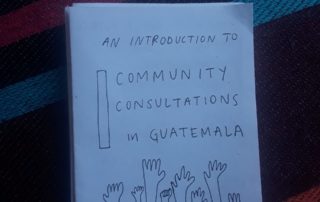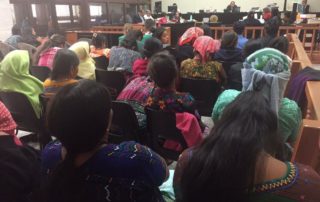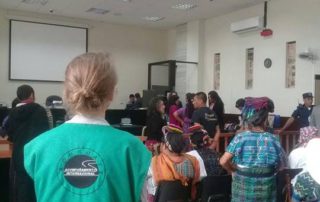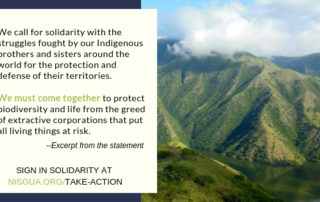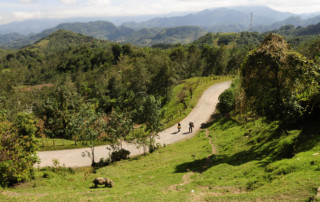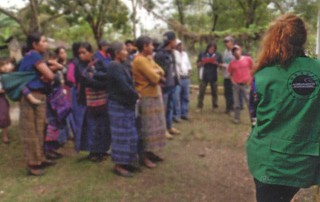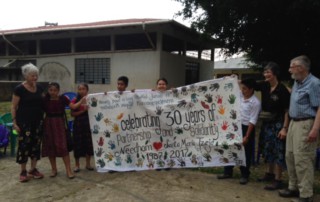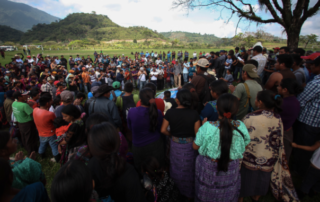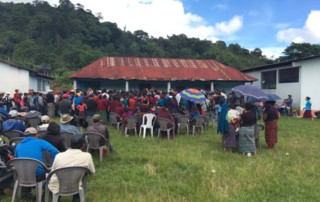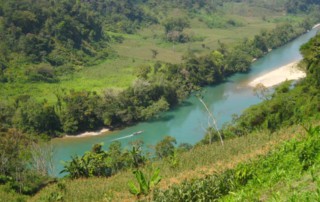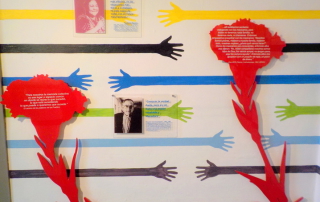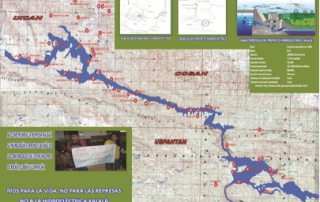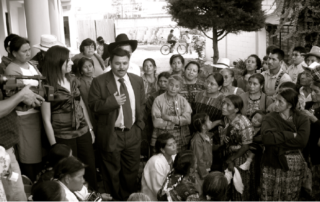Guatemala Accompaniment Project – GAP Internacionalista
Providing solidarity at the request of Guatemalan organizers who are under threat for their work
What is accompaniment?
NISGUA is one of the many organizations worldwide using international accompaniment as a strategy in the global struggle for the protection of human rights. Organizations, communities and activists under threat request an international presence as a security measure to dissuade attacks and create a safer space for them to carry out their human rights and social justice work.
How does accompaniment work?
In Guatemala, state and corporate actors, as well as parallel and clandestine power structures dating from the internal armed conflict and favored by the climate of impunity in the country, continue to exert power through intimidation, criminalization and violence. When human rights violations such as these take place, the monitoring and reporting done by NISGUA accompaniers through the Guatemala Accompaniment Project (GAP) serves to alert the international community. Our networks take action and pressure the Guatemalan government, transnational corporations and other actors to encourage the protection of human rights.
Who do we accompany?
We provide accompaniment to organizations and individuals involved in key legal cases seeking justice and accountability for genocide and crimes against humanity – including massacres, torture and forced disappearances – committed during Guatemala’s internal armed conflict. This includes one of our longest and most extensive accompaniment relationships, with the witnesses and communities of the Association for Justice and Reconciliation (AJR). A courageous group of survivors, the AJR filed charges in 2000 and 2001 against former military dictators Efraín Ríos Montt, Romeo Lucas García and their military high commands.
In the Guatemalan post-conflict context, international investment in large-scale mega-development projects like mining and hydroelectric dams increased. So, too, did the attacks against community leaders and organizations speaking out against these industries and in defense of life and territory. GAP provides ongoing accompaniment to individuals and organizations under threat and increasingly criminalized for their organizing in defense of their resources, communities, culture and human rights.
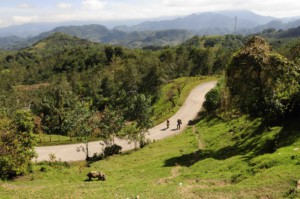
GAP Internacionalista seeks to dissuade violence against our Guatemalan partners and connect them to movements in the U.S. for Indigenous sovereignty and immigration justice. All GAP Internacionalista work is done at the request of our partners and according to their strategic vision. GAP Internacionalista uses a diversity of tactics, including human rights observation and documentation, physical presence, grassroots education, campaigns, and advocacy with decision makers. Volunteer accompaniers serve for periods of six months to a year, and then return to organize their home communities in solidarity with our Guatemalan partners.
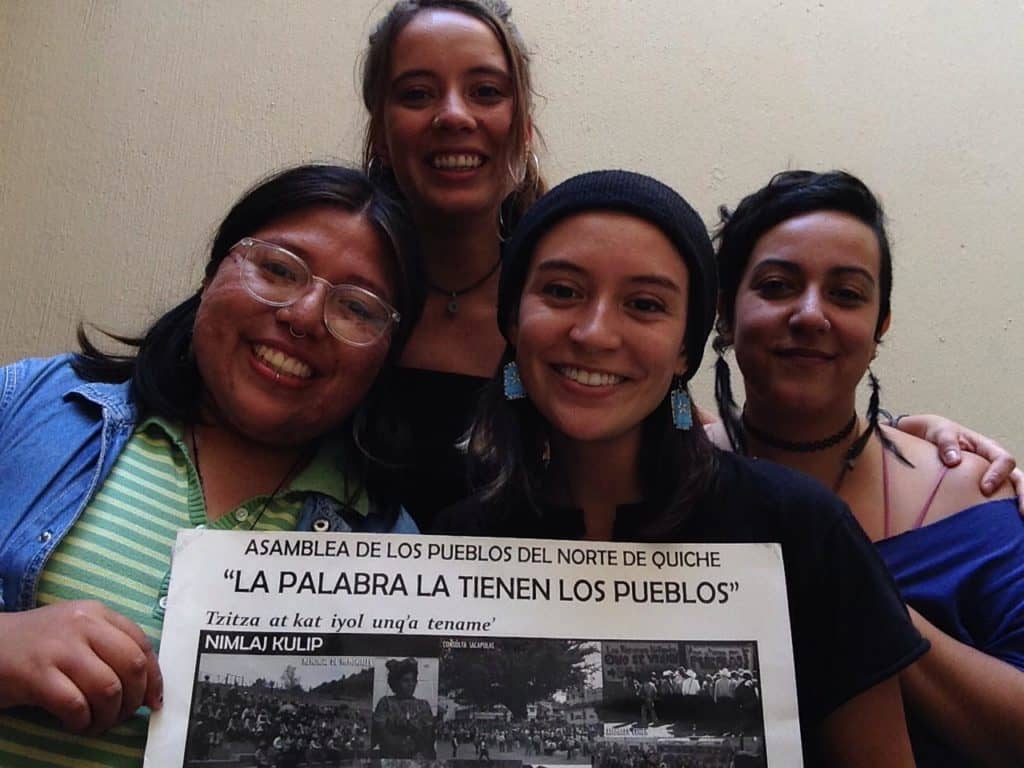
Isa, Chris, Nico y Michelle, former Internacionalistas at NISGUA’s office in Guatemala.
“The work of NISGUA is highly important to the Xinka People. Through NISGUA we are able to visibilize our work and struggle. This is important because when the authorities see that we have international accompaniment, we feel strong, we feel good, because we know that the authorities are afraid of international inspection”.
“Being an accompanier with NISGUA was an extremely important piece in my political formation and radicalization. Learning from and collaborating with our Guatemalan partners, forming mutual relationships, and incorporating lessons from their luchas has been such a beautiful honor. The work is deeply valued by our partners and must continue until it is no longer necessary”.
“I was already an organizer when I joined NISGUA. I had already spent years of my life working towards realizing visions of a world that is capable of embracing all in its wholeness. And even given that, my experience as an Aco with NISGUA transformed my perspective. It helped me to embody a sense of “nosotres”, a collective sense at the cellular level, that I had never achieved in the US. Sure, there are parts of being an Aco that are shocking, but I found that the transformation happened in the most mundane, everyday parts. To be an Aco is to have your expectations shattered, to really question the use of solidarity, to learn to build a purpose that links you to a collective understanding of life”.
“Internationalism is recognizing how interconnected we all are, collaborating in cross-border struggles for justice, and working together to dismantle systems of oppression. It was a great honor for me to accompany struggles for land, territory and justice in Guatemala, struggles that are ultimately interwoven and closely connected with those in the United States. My time as an accompanier taught me invaluable lessons on humility, privilege, creativity, anti-racism, resilience, trauma, relationship-building, and accountability and left me with the desire to continue doing my part for the long haul”.
“For me, international accompaniment is essential to establish relationships and solidarity between global movements. Accompanying in Guatemala from the U.S. is a way to combat the imperialism that created and is creating environmental, economic and political crises in the global south, and the best way to meet amazing Guatemalans and support their resistance. I am excited to be an ACO in 2024 and invite you to be part of the program with me!”.
“Internationalism is a critical response to the ever-expanding global influence of the dominant classes; as their power transcends borders, so must our resistance. Yet, as internationalist people-power expands over borders, it does not homogenize and it does not accumulate. Rather, it employs the full spectrum of human expression as a means to democratize power structures. It hinges on the transformation of our diversities – and the ways that those diversities intersect with experiences of autonomy and oppression – into collective resistance through globalized solidarity. It signifies the recognition that the collective liberation of working people, spanning both colonized and colonizing nations, can only be achieved through the formation of a unified coalition”
Sponsoring Communities
Our Sponsoring Community partnerships provide the resources, energy, and political action necessary to ensure ongoing international accompaniment in Guatemala. Their long-term commitment to human rights and solidarity is an essential component of the longevity and sustainability of GAP. Sponsoring Communities provide financial support to individual accompaniers and are key members of NISGUA’s organizer network.
When GAP accompanied the return of displaced peoples, many Sponsoring Communities developed deep relationships with sister Guatemalan communities, many of which continue to this day. Today, Sponsoring Communities provide critical funds to support individual accompaniers and program work.
Sponsoring Communities are also key organizers in NISGUA’s grassroots initiatives to amplify the voices of our Guatemala partners and connect struggles for justice between Guatemala and the U.S. Responding to accompanier alerts, they organize their members to take action in the face of violence against activists.
GAP is always looking to create new Sponsoring Communities; if you are interested in forming a Sponsoring Community, please contact gap@nisgua.org.
Current Sponsoring Communities
Contact person Connie Vanderhyden can be reached at connie.vanderhyden@gmail.com.
For more information, contact Dale Sorenson at and learn more at www.mitfamericas.org.
Chris Hansen is the primary contact person and can be reached at marcuschristian@hotmail.com.
For more information, write to Brenda Metzler at bmetzler7@verizon.net or visit www.needhamcongregational.org.
The Unitarian Universalist Church of Arlington (UUCA) became a NISGUA Sponsoring Community in 2007. Their congregation is engaged in an array of local activities, including solidarity work with a local immigrant community and community organizing through VOICE (Virginians Organized for Interfaith Community Engagement). Their commitment to social justice has deepened their work with NISGUA in recent year, resulting in a yearly ALIANZAS-specific delegation to Guatemala and ongoing organizational support to NISGUA. Through ALIANZAS, UUCA currently provides support for two accompaniers. ALIANZAS publishes information regularly in a newsletter and organizes local speaking tours with the accompaniers they sponsor.
For more information, contact the project coordinator Anne McKnight at amcknight4646@gmail.com and the NISGUA partnership Contact, Marcia Trick at marciatrick@gmail.com
Barbara Fuchsman is the contact person for SEPA. She can be reached at bafuchsman@oberlin.net.
Ready to apply?
We believe international solidarity requires the participation of communities who are similarly impacted by the same global systems that violate human rights and threaten those working for true self-determination and justice in Guatemala, as well as their allies. Applications from people of color, Indigenous/Indigenous descent, poor/working class, women, LGBTQI people, and candidates with strong anti-racism/ally experience will be prioritized; all are encouraged to apply.
The application process to become an accompanier is the beginning of many steps of training that continue through a volunteer’s entire time with NISGUA. It’s also a process of mutual discernment of compatibility between NISGUA and the applicant. We strongly encourage applicants to ask lots of questions of NISGUA staff and reach out for advice from trusted comrades while they discern if being an accompanier with NISGUA is a good fit for them
If you would like to apply, please fill out the application form (found to the right), upload a one page resume highlighting relevant experience, and ask at least one contact contacts to share their email or phone number with us in order to have a reference call (In the reference form found to the right you can see what kind of questions we will ask).
Requirements include:
- Rigorous commitment to creating a culture of feedback, accountability, wellness and mutual support.
- Demonstrated commitment to human rights and social, economic, ecological, racial and disability justice is required. The ability to document and analyze events and conditions in order to produce quality written reports and educational materials.
- Cultural sensitivity; excellent judgment skills; ability to work flexibly in dynamic, changing situations; resourcefulness in self-care and relational dynamics.
- A high level of verbal and written Spanish or the ability to develop it with six weeks of intensive study.
- A familiarity with the history of Central America/U.S. relations, the current situation in Guatemala, and a basic understanding of human rights/accompaniment.
- Previous experience in Latin America (especially rural areas) strongly preferred.
- Awareness of security issues, willingness to work in a situation which might involve risk, interest in individual and team analysis.
- Familiarity with or willingness to learn strategies for grassroots fundraising and education in the US.
- A minimum six month commitment.
- A U.S. passport and/or a strong connection to a U.S. community.
Benefits include:
- Lodging provided at our main office in Guatemala City.
- A $530 monthly stipends to cover health insurance and most in-country travel expense (individual fundraising also required).
- Immersion in the Guatemalan social, cultural, political, and linguistic context.
- Trainings on accompaniment and organizing.
- Ongoing check-ins, trainings, and support from Guatemala City staff on well-being, political analysis, organizing, and professional development.
- Access to a grassroots networks of nearly four decades of NISGUA organizers and activists.
If you have additional program questions, please email gap[at]nisgua.org.

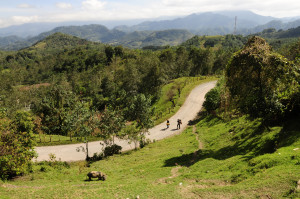
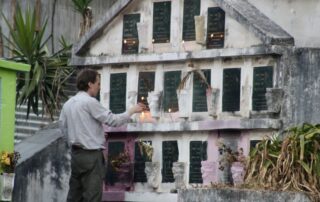
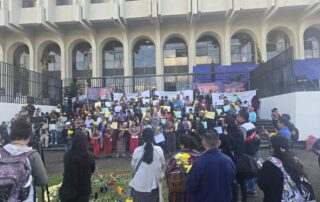
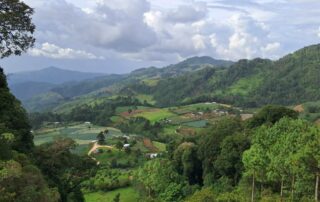
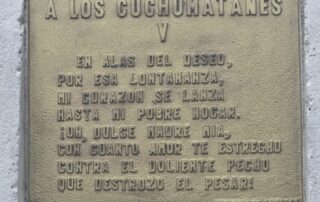
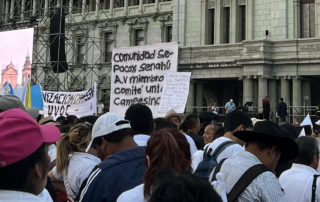
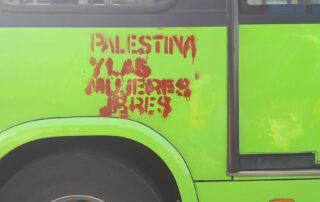
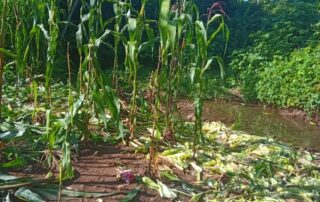
![[ESP] Una tarjeta blanca sostenida por una mano. en la tarjeta se dibuja una vela con lápiz negro y unas letras que dicen: Don Noé presente. Por arriba y debajo de la vela pegado unos pétalos de rosas. [ENG] A white card held by one hand. On the card is drawn a candle with black pencil and some letters that say: Don Noah present. Above and below the candle glued some rose petals.](https://nisgua.org/wp-content/uploads/Untitled-design-11-320x202.png)
![[ENG] Landscape of Guatemala. With blue sky and green grass and mountains at the bottom. [ESP] Paisaje de Guatemala. Con cielo azul y hierba verde y montañas al fondo.](https://nisgua.org/wp-content/uploads/signal-2024-02-01-141339_005-320x202.jpeg)
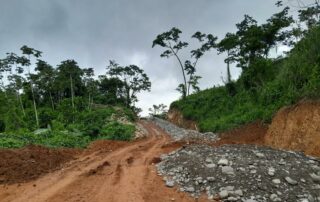
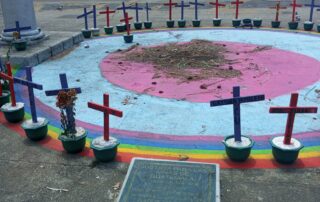
![[ESP] En una calle de guatemala, en el muro de un parque, hay un grafiti con letras blancas que dice: La memoria es justicia para nuestrxs abuelxs. [ENG] n a street in Guatemala, on the wall of a park, a graffitti with white letter said: The memory is justice for our ancesters](https://nisgua.org/wp-content/uploads/IMG_5471-320x202.jpg)
